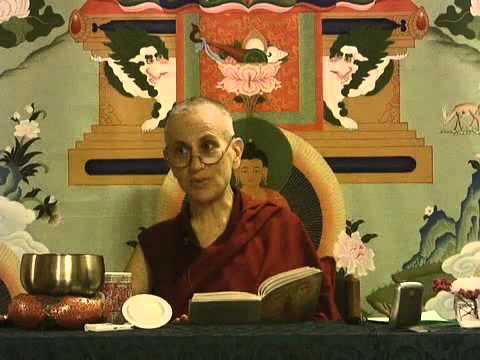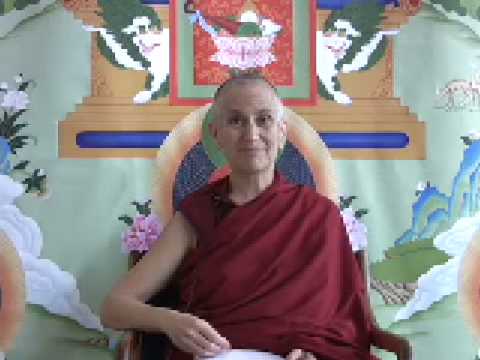Being a wise practitioner
Before doing 41 Verses, I thought of something else from last night. We were talking about how some of the things that we’ve been used to, received happiness and pleasure from—when we come to the Dharma and we start to look more closely, we see that yes, sure there was some good feeling and some happiness and pleasure, but there were also a lot of problems and that whatever happiness we have isn’t an ultimate happiness. It’s not something that’s going to last. It’s not something that’s free of faults in any way.
We were also discussing how some people, when they first understand this, have a feeling of depression like, “Oh, the Buddha just took all my happiness away from me. How am I ever going to have any happiness now?” And you meet so many people like this when they first begin to understand the Dharma, “Oh, Dharma is really depressing. It’s pessimistic.” All these misconceptions about, “All pleasures are bad and happiness is bad and I’m sinful and evil if I am happy.” That whole thing on one side, but then just this feeling of kind of being upset because, “I counted on all these things for happiness, and now you’re telling me that they’re not happiness,” and we’re upset. We’re not quite sure what we’re upset at—if we’re upset with the Buddha for making it apparent to us or if we’re upset with the things that we used to think we’re the causes of happiness, because “You betrayed me. You’re supposed to be the cause of happiness.” Our mind’s very confused. We’re not really so clear what we’re upset about, but we’re just upset in general.
I was thinking that actually I think that upsetness comes because one part of the mind is still clinging on to those things as the source of happiness. The mind doesn’t really want to accept that they aren’t the source of happiness because we’ve invested a lot of energy, a lot of time, a lot of what our life is about, in investing happiness in those things. We don’t want to have to change. So we’re upset by having to change. Whereas actually, the way to see it with wisdom is those things aren’t the cause of happiness, then let’s get on with it. Drop them and let’s do something that is going to cause happiness instead of being upset and mourning and trying to make them turn out to be happiness one way or another because we have so much invested in it. Just say, “Well, it’s not working. Let’s do what I got to do to work for something to work.”
I thought of an analogy that might make it easier to understand. Let’s say that you’re somebody from the East Coast who came to California to mine gold. You get to this place that is reputed to have lots of gold. You set yourself up. You have a nice house. You have everything, and you have a nice setup there. You’re panning for gold, and you get just a little bit here, but it’s not kind of coming the way you thought it was going to be. Then somebody comes along and says, “You know, I’ve been here. There’s no gold. You’re wasting your time panning for gold here because I’ve been here, and I’ve seen this.” Then how do we react? If you’re a smart person you say, “Thank you so much for telling me. Tell me where the gold is, and I’ll go there.” That person says, “Well you go over here, and you’re going to find gold there.” So the smart person says “Okay. Boy, I’ve been saved a lot of hassle and headache and disappointment and disillusionment and wasted efforts by this person telling me this, and I’ve also seen that I haven’t gotten so much gold, but this person is kind and tells me this and they also tell me gold’s over there, so let’s follow what they have.”
That’s what the smart person does. The foolish person says, “But I built the house here, and I have a nice house here. It’s a comfortable house, and I don’t want to move my house to go look for gold somewhere else. It’s like I have this nice house, so I want to stay here, and I’ll just look for gold here. And that person who told me there’s no gold, that they’ve been here before, they might be wrong. I mean what do they know? I’ve actually found these little bitty bits, and there really might be more, and I don’t think I should trust what that person said, and anyway I’m too lazy. I don’t want to build another house over there.”
Your house is your whole ego identity that you’ve invested in trying to get happiness from the gold, which is the worldly things, and you’ve invested a lot of time, a lot of energy, a lot of your ego identity. You’re so lazy. Who wants to have to set up another ego identity? When you look somewhere else: “I have to go through, and I have to set up an ego identity as a Dharma practitioner, and I have to do this and that which is different than what I’m doing now, and I have my whole routine, and I’m so comfortable in it. Why do I have to change?”
But the nice thing is, as a Dharma practitioner, you don’t have to set up another ego identity. [laughter] You just go where there’s the gold, and you live happily, and then you don’t need to be upset at either the place where you thought there was gold or at the person who told you, who’s the Buddha. You just say, “Thanks so much. No gold? You say there’s gold here, I’m going.”
Do you see how it’s this mind of entrenched self-grasping and entrenched laziness that doesn’t want to eliminate the self-grasping that gets us in this thing of, “This is depressing. I wish the Buddha didn’t tell me. [laughter] I mean I know I’m miserable, but I have my whole setup here in samsara. I don’t want to have to change it.” You see the difference between being a foolish person who listens to the Dharma or being a lazy person who listens and being a wise person who just, “Whew, that saved me a whole lot of hassle. I’m off over here for the gold.” And that person’s happy about it, aren’t they? It’s like, “Oh I’m so relieved.” Yes? In that same way, instead of mourning and feeling depressed, we should really feel relieved and happy to find out where the gold is and where the true happiness lies.
Venerable Thubten Chodron
Venerable Chodron emphasizes the practical application of Buddha’s teachings in our daily lives and is especially skilled at explaining them in ways easily understood and practiced by Westerners. She is well known for her warm, humorous, and lucid teachings. She was ordained as a Buddhist nun in 1977 by Kyabje Ling Rinpoche in Dharamsala, India, and in 1986 she received bhikshuni (full) ordination in Taiwan. Read her full bio.


